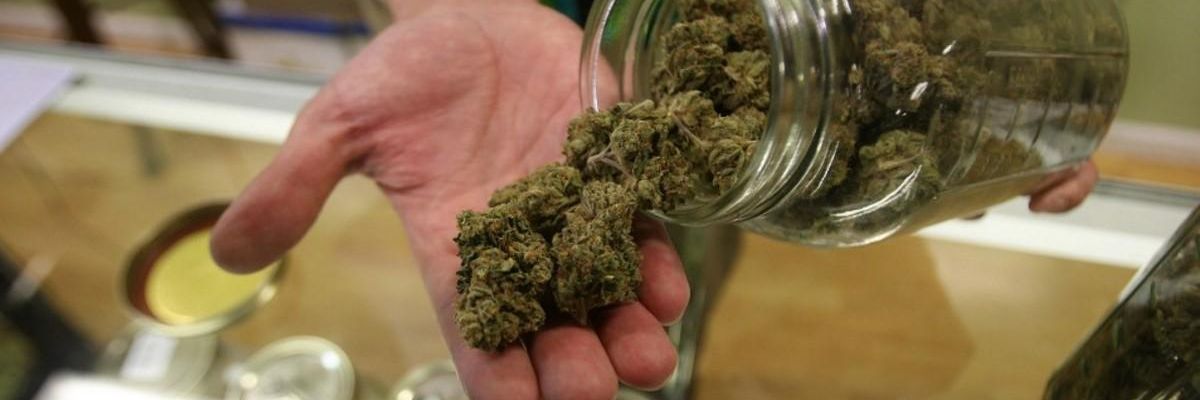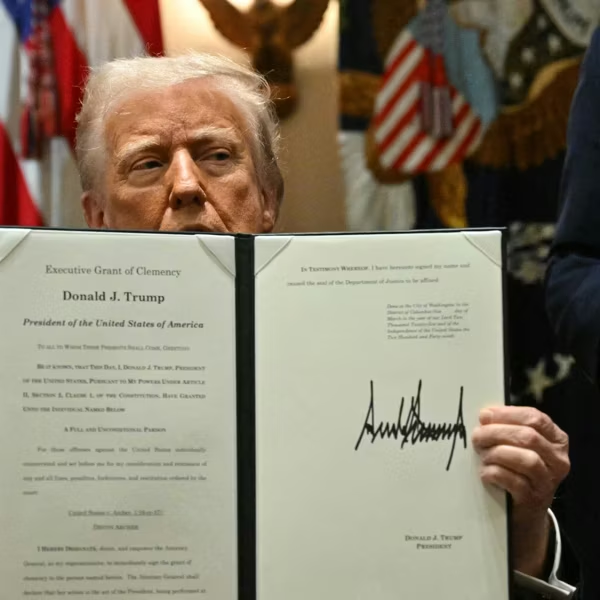
Dave Warden, a bud tender at Private Organic Therapy (P.O.T.), a non-profit co-operative medical marijuana dispensary, displays various types of marijuana available to patients on October 19, 2009 in Los Angeles, California. (Photo: David McNew/Getty Images)
Biden's Marijuana Pardons Are a Big Deal
The immediate impacts are modest, but the order marks a top-level recognition that 100 years of cannabis prohibition were a mistake.
Fulfilling a high-profile campaign pledge, President Joe Biden recently announced that his office will be issuing pardons to several thousand Americans with federal convictions for marijuana possession offenses.
Why are states and cities continuing to prosecute hundreds of thousands of people every year for behavior that most Americans no longer believe ought to even be a crime?
"There are thousands of people who have prior federal convictions for marijuana possession, who may be denied employment, housing, or educational opportunities as a result," the president said. "My action will help relieve the collateral consequences arising from these convictions."
But almost all marijuana-related arrests are for violations of state and local laws, not federal law.
As a result, White House officials have estimated that the president's directive will bring relief to an estimated 6,500 people--only a fraction of the nearly 29 million Americans who have been arrested for marijuana violations over the past several decades.
Nevertheless, Biden's actions mark a seismic shift in the way those inside the Beltway talk and think about cannabis.
Historically relegated as a fringe political issue, Biden's foray into the arena of marijuana reform legitimizes legalization as a subject worthy of consideration--and action--by those at the highest levels of government. Further, it is a recognition--by the president of the United States, no less--that America's nearly 100-year experiment with cannabis criminalization has been an abject failure.
Indeed, the administration's actions acknowledge that arresting and criminalizing those who possess and consume marijuana does more harm than good.
This acknowledgement thus begs the question: Why are states and cities continuing to prosecute hundreds of thousands of people every year for behavior that most Americans no longer believe ought to even be a crime?
It's a valid question. And it is one that leaders in Congress now need to answer.
By making the first move, the president has amplified the pressure on Congress--and Democratic leadership in particular--to respond.
According to polling data provided by Morning Consult, nearly half of registered voters--including majorities of younger voters and Democrats--believe that repealing federal marijuana prohibition ought to be a legislative priority for Congress. Nonetheless, for far too long, elected officials--and those in the Senate in particular--have provided little more than lip service.
Specifically, Senate Chuck Schumer pledged prior to the 2020 election, "If I become majority leader, I will put this on the floor and it's likely to pass." Yet in the nearly two years since then, no stand-alone marijuana legislation has made it through the Senate to the president's desk.
But that could all now change.
By getting out in front of this issue, President Biden is now receiving well deserved attention and accolades. His actions are not only good policy--they are good politics. Polling finds that a solid majority of Americans support the expungement of criminal records for those convicted of marijuana-related possession crimes.
But ultimately the White House can't repeal or amend federal marijuana laws unilaterally. Like it or not, Congress must eventually weigh in on the issue by passing legislation.
President Biden has demonstrated that the time to do so is now. And most Americans agree.
An Urgent Message From Our Co-Founder
Dear Common Dreams reader, The U.S. is on a fast track to authoritarianism like nothing I've ever seen. Meanwhile, corporate news outlets are utterly capitulating to Trump, twisting their coverage to avoid drawing his ire while lining up to stuff cash in his pockets. That's why I believe that Common Dreams is doing the best and most consequential reporting that we've ever done. Our small but mighty team is a progressive reporting powerhouse, covering the news every day that the corporate media never will. Our mission has always been simple: To inform. To inspire. And to ignite change for the common good. Now here's the key piece that I want all our readers to understand: None of this would be possible without your financial support. That's not just some fundraising cliche. It's the absolute and literal truth. We don't accept corporate advertising and never will. We don't have a paywall because we don't think people should be blocked from critical news based on their ability to pay. Everything we do is funded by the donations of readers like you. Will you donate now to help power the nonprofit, independent reporting of Common Dreams? Thank you for being a vital member of our community. Together, we can keep independent journalism alive when it’s needed most. - Craig Brown, Co-founder |
Fulfilling a high-profile campaign pledge, President Joe Biden recently announced that his office will be issuing pardons to several thousand Americans with federal convictions for marijuana possession offenses.
Why are states and cities continuing to prosecute hundreds of thousands of people every year for behavior that most Americans no longer believe ought to even be a crime?
"There are thousands of people who have prior federal convictions for marijuana possession, who may be denied employment, housing, or educational opportunities as a result," the president said. "My action will help relieve the collateral consequences arising from these convictions."
But almost all marijuana-related arrests are for violations of state and local laws, not federal law.
As a result, White House officials have estimated that the president's directive will bring relief to an estimated 6,500 people--only a fraction of the nearly 29 million Americans who have been arrested for marijuana violations over the past several decades.
Nevertheless, Biden's actions mark a seismic shift in the way those inside the Beltway talk and think about cannabis.
Historically relegated as a fringe political issue, Biden's foray into the arena of marijuana reform legitimizes legalization as a subject worthy of consideration--and action--by those at the highest levels of government. Further, it is a recognition--by the president of the United States, no less--that America's nearly 100-year experiment with cannabis criminalization has been an abject failure.
Indeed, the administration's actions acknowledge that arresting and criminalizing those who possess and consume marijuana does more harm than good.
This acknowledgement thus begs the question: Why are states and cities continuing to prosecute hundreds of thousands of people every year for behavior that most Americans no longer believe ought to even be a crime?
It's a valid question. And it is one that leaders in Congress now need to answer.
By making the first move, the president has amplified the pressure on Congress--and Democratic leadership in particular--to respond.
According to polling data provided by Morning Consult, nearly half of registered voters--including majorities of younger voters and Democrats--believe that repealing federal marijuana prohibition ought to be a legislative priority for Congress. Nonetheless, for far too long, elected officials--and those in the Senate in particular--have provided little more than lip service.
Specifically, Senate Chuck Schumer pledged prior to the 2020 election, "If I become majority leader, I will put this on the floor and it's likely to pass." Yet in the nearly two years since then, no stand-alone marijuana legislation has made it through the Senate to the president's desk.
But that could all now change.
By getting out in front of this issue, President Biden is now receiving well deserved attention and accolades. His actions are not only good policy--they are good politics. Polling finds that a solid majority of Americans support the expungement of criminal records for those convicted of marijuana-related possession crimes.
But ultimately the White House can't repeal or amend federal marijuana laws unilaterally. Like it or not, Congress must eventually weigh in on the issue by passing legislation.
President Biden has demonstrated that the time to do so is now. And most Americans agree.
Fulfilling a high-profile campaign pledge, President Joe Biden recently announced that his office will be issuing pardons to several thousand Americans with federal convictions for marijuana possession offenses.
Why are states and cities continuing to prosecute hundreds of thousands of people every year for behavior that most Americans no longer believe ought to even be a crime?
"There are thousands of people who have prior federal convictions for marijuana possession, who may be denied employment, housing, or educational opportunities as a result," the president said. "My action will help relieve the collateral consequences arising from these convictions."
But almost all marijuana-related arrests are for violations of state and local laws, not federal law.
As a result, White House officials have estimated that the president's directive will bring relief to an estimated 6,500 people--only a fraction of the nearly 29 million Americans who have been arrested for marijuana violations over the past several decades.
Nevertheless, Biden's actions mark a seismic shift in the way those inside the Beltway talk and think about cannabis.
Historically relegated as a fringe political issue, Biden's foray into the arena of marijuana reform legitimizes legalization as a subject worthy of consideration--and action--by those at the highest levels of government. Further, it is a recognition--by the president of the United States, no less--that America's nearly 100-year experiment with cannabis criminalization has been an abject failure.
Indeed, the administration's actions acknowledge that arresting and criminalizing those who possess and consume marijuana does more harm than good.
This acknowledgement thus begs the question: Why are states and cities continuing to prosecute hundreds of thousands of people every year for behavior that most Americans no longer believe ought to even be a crime?
It's a valid question. And it is one that leaders in Congress now need to answer.
By making the first move, the president has amplified the pressure on Congress--and Democratic leadership in particular--to respond.
According to polling data provided by Morning Consult, nearly half of registered voters--including majorities of younger voters and Democrats--believe that repealing federal marijuana prohibition ought to be a legislative priority for Congress. Nonetheless, for far too long, elected officials--and those in the Senate in particular--have provided little more than lip service.
Specifically, Senate Chuck Schumer pledged prior to the 2020 election, "If I become majority leader, I will put this on the floor and it's likely to pass." Yet in the nearly two years since then, no stand-alone marijuana legislation has made it through the Senate to the president's desk.
But that could all now change.
By getting out in front of this issue, President Biden is now receiving well deserved attention and accolades. His actions are not only good policy--they are good politics. Polling finds that a solid majority of Americans support the expungement of criminal records for those convicted of marijuana-related possession crimes.
But ultimately the White House can't repeal or amend federal marijuana laws unilaterally. Like it or not, Congress must eventually weigh in on the issue by passing legislation.
President Biden has demonstrated that the time to do so is now. And most Americans agree.

